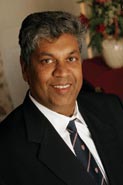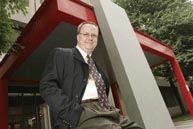Dynamic decanal appointments
Chandra Madramootoo takes helm at Macdonald Campus

Madramootoo, new dean of the Faculty of Agricultural and Environmental Sciences
Owen Egan
Heading into its second century of operation, the McGill Faculty of Agricultural and Environmental Sciences has a new dean, adding to an illustrious list of the 11 that came before. Almost 100 years after J.W. Robertson was appointed the school's first principal in 1906, Chandra Madramootoo officially took office on August 15.
Madramootoo, a 21-year veteran of the faculty, has been the director of the Brace Centre for Water Resources Management for the past six years. The previous dean, Deborah Buszard, resigned four years into her five-year mandate to pursue studies in landscape design as part of a one-year sabbatical at the University of British Columbia.
Madramootoo began his career in 1984 at McGill's Macdonald Campus as a lecturer in the Department of Agricultural Engineering (now called Bioresource Engineering). He obtained his undergraduate and graduate degrees at McGill in agricultural engineering before joining the faculty, and brings to the job a wealth of experience and knowledge in the field of water and land resources management.
As founder and director of the renowned Brace Centre, he feels scaling back on some of his research may be the hardest part of the transition to his new position. "I won't be able to maintain such a high level of research. One of my challenges will be to help and encourage other staff members with their research," he says.
Madramootoo is acquainted with many of the faculty's departments and staff. "I've worked with many of the departments on campus. It's not a steep learning curve for me. I'm familiar with the challenges we face."
The learning curve may not be steep, but there are no shortages of challenges facing the new dean. High on Madramootoo's list is the academic program review being conducted by the entire McGill community over the next two years. This process that will look at the quality, content and applicability of all courses. "We want to make sure our programs are relevant and of high quality," he says. "There may be some streamlining of courses with low enrolment."
McGill is also in the initial stages of a major capital campaign and the faculty's new leader wants to make sure his staff and student needs are well articulated. Priorities include increasing funding for student scholarships, upgrading teaching labs, renewing of infrastructure and creating more endowed chairs. Madramootoo estimates he will spend significant time on fundraising and alumni activities. "I accept that part of the job," he says. "You have to go after sponsors and donors to ensure that our priorities and needs are part of the campaign."
A more immediate and pressing challenge for the new dean and his faculty is the upgrading of the animal care facilities. The Canada Committee on Animal Care (CCAC), which evaluates the campus animal care facilities, has been critical of some of the aging infrastructure on the Macdonald Campus. Ventilation systems, cages and surgical areas are just some of the priority zones that need upgrading. Madramooto describes this as a "hot file," for the short term, but for the long term he stressed the need to offer researchers a place where they can expand their scope. "We want to intensify our research activity," he adds. "Especially in areas like food and nutrition, environment and biotechnology, where we have an outstanding international reputation. These are of global importance, as we expand our international research and training programs," he says.
The challenge in any change of leadership is to get those surrounding you to share your vision. To that end, Madramootoo doesn't see himself as a top down kind of administrator. He wants to see people come out of their "silos."
"I would like to see our staff and students be more cross-disciplinary; to see departments step outside their boundaries. I'm hopeful that my colleagues will rally round that idea," he says.
The Macdonald Campus of McGill stacks up well against other well-known Canadian agricultural-oriented universities like Guelph and the University of Alberta, and some of the well-known U.S. agricultural schools. Part of his vision is to ensure that McGill maintains its place as one of the top 10 research institutions in North America. "That means we have to deliver the best quality academic program with the best possible quality staff." There is global competition for top staff and students.
With a handful of new professors hired this year due to retirements, McGill has to offer competitive salaries and research facilities. "Top people are attracted by a healthy research environment," he explains. "With global competition for talent, we have to be able to sustain that healthy environment, then mentor and support our new professors."
Madramootoo feels a deep connection to the community around the campus. He and his wife Elizabeth (who's a teacher/librarian) are long-time West Island residents. They also have a six-year-old daughter.
Peter Enright, a professional associate and faculty lecturer in the bioresource engineering department, has been Madramootoo's friend and professional associate since the halcyon days of their master's studies together in the early 1980s. He believes Madramootoo is right for the job. Enright has worked with Madramootoo since 1989, including at the Brace Centre for Water Resources Management. "Everywhere he's been, he's been successful. He's unbelievably energetic and results-oriented. He's a natural, good choice for the job."
Peter Todd takes on management portfolio

Todd, new dean of the Desautels Faculty of Management
Owen Egan
Peter Todd is back at his alma mater with a whole new assignment. As the newly appointed dean of the Faculty of Management, the McGill grad (BCom '83) looks forward to repositioning his school as one of the top 10 in the world.
"It's time to roll up our sleeves and better promote the fantastic programs we already have in-house," he says.
Todd has returned to McGill with a big task — to polish the jewels buried in the Faculty Management's crown. He has the good fortune of taking the helm at a time when old programs are being retooled and new programs are being launched.
One innovation that Todd will help introduce this November is the new interdisciplinary program between the Faculty of Management and the Faculty of Medicine: the International Masters for Health Leadership (IMHL). The cutting-edge program, a Canadian first, was created by management professor Henry Minztberg and Faculty of Medicine professor Sholom Glouberman to teach practitioners how to improve the management of our health institutions.
Todd will also have an opportunity to look back, while looking forward, as the Faculty of Management celebrates a milestone this fall: the 40th anniversary of the MBA program.
And who better to lead the Faculty of Management's resurgence than Todd, who for the last two decades has held various leadership roles south of the border? He built his reputation investigating the field of information technology, including such emerging sectors as online shopping, while raising funds for cash-strapped American universities.
His last position was senior associate dean at the University of Virginia McIntire School of Commerce. Previously, he was a professor and director of the Information Systems Research Center and associate dean at the University of Houston College of Business Administration.
"Peter Todd is a strategic visionary and a very strong leader," says Michael Koenig, a former colleague and assistant dean, McIntire School of Commerce, adding McGill is lucky to get him.
In Canada, Todd served as professor of management (information systems) at Queen's University and director of research and PhD programs. His own PhD is in information systems from the University of British Columbia.
McGill principal Heather Munroe-Blum says Todd joins McGill at a critical and exciting time: "This is a superb appointment. Peter Todd will serve as a perfect fit between the achievements of McGill and the aspirations of the Faculty of Management."
Anthony Masi, Interim Provost and CIO, is confident that Todd will propel his faculty from good to great. "Peter Todd is the right choice for his mandate: he is credible to academics, as well as the business and fundraising communities," says Masi. "He is a great administrator, sets high standards for himself and for others."
For his part, Todd stresses, becoming dean at McGill was a natural step in his long career in administration. "I want to take the Faculty of Management to the next level — and I will encourage innovation whenever things can be made better and smarter," he says.
His vision is already taking shape. His number one priority? "Make the faculty of Management the best business school in Canada," he says.
Another priority is to replenish the faculty's coffers. "We need to reach out to the local business community that has benefited from many of our graduates who work at the top of their ranks," he continues.
A third priority is to promote continuous learning options for the business community, such as McGill's Advanced Leadership Program (ALP), a master's curriculum that enables practicing managers to sharpen their leadership.
"We want to foster an even greater community of lifelong learners," says Todd. "We have executives who come to McGill and love to learn here. We want these people to come back here again, or send their employees, for additional training."
Todd understands, first-hand, the importance of developing lifelong learning partnerships. As a teenager, he was tutored in calculus by Michael Avedesian, who now works in the Office of Technology Transfer and teaches organizational policy in the Faculty of Management. In exchange, Todd would babysit Avedesian's children.
Their relationship has come full circle with Todd assuming their faculty's top spot. "He is now tutoring me," chuckles Avedesian, and adds he was extremely pleased when he found out that Todd would be his faculty's new head. "There could not be a better choice to meet the challenges for the next five years," says Avedesian. "I am happy that I helped him pass calculus!"

